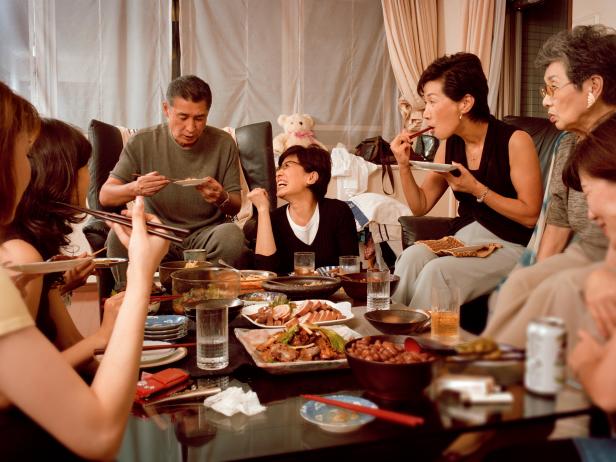Sitting Down to Eat with Your Family Is Good for You – No, Really
Studies show people are gathering to eat with friends and family more often — and the ritual has been linked to a whole host of emotional, social and physical benefits.

Ariel Skelley/Getty
How we live our lives has changed in many ways these past two years, including a sweet one: We’re more inclined to make time to sit down to eat — often with family or friends — than before the pandemic, surveys have shown.
Forty-four percent of Americans ages 25 and older surveyed by the meat-delivery brand ButcherBox said they sit down for dinner more often than pre-pandemic, with 56 percent of respondents saying they now do so most nights.
The trend may be especially pronounced in millennials and Gen Z, with 25 percent of them saying they had resolved to eat at the dinner table more often and 49 percent saying they cook more at home as a result of the pandemic. Fewer than 16 percent said they planned to revert to their old cooking habits as restrictions loosen.
A separate nationwide study, conducted by The Family Dinner Project, a non-profit based at Massachusetts General Hospital’s Psychiatry Academy, in collaboration with Harvard Graduate School of Education, found that family dinners increased for more than 50 percent of American families during the pandemic — a finding that held across race, class, educational attainment and political affiliation. A majority of families said dinners were not only more frequent, but also qualitatively better, and they intended to hold onto the dinnertime changes they’d made once the pandemic is over.
“At a time when families needed the comfort of daily rituals, more than half of families in our nationwide survey reported they had more shared dinners and enjoyed them more than before the pandemic,” says Anne Fishel, PhD, a family therapist at Massachusetts General Hospital and an associate clinical professor of psychology at Harvard Medical School, who co-authored The Family Dinner Project/Harvard study. “An uptick in regular family mealtime may provide one piece of the healing for stressed families as we slowly emerge from the pandemic.”
And it wasn’t only families with children who reported pandemic-prompted dinnertime changes: Shared meal times also increased for those who were married or living with a partner, the research indicated.
We asked Fishel, director and cofounder of The Family Dinner Project and a contributor to Eat, Laugh, Talk: The Family Dinner Playbook, about the benefits of gathering around the table — whether with family or friends.

Patrick Chu/Getty
The benefits of gathering around the table as a family are real and dramatic for kids.
Fishel says dozens of scientific studies conducted over 25 years have shown that family dinners benefit kids’ bodies, brains and mental health. Specifically, when families share meal times, kids have higher grades and larger vocabularies, research shows; they also develop greater resilience and have lower rates of depression, substance abuse and obesity. Plus they have better nutrition.
“Kids who dine with their parents feel less stress, feel more known by their parents and feel that they have a better relationship with them,” Fishel notes.
Adults also see big boosts in nutrition and social-emotional health from sharing meals.
Adults also benefit from regularly gathering around the table with friends and family, with research indicating boosts in nutrition (they eat more fruits and vegetables, and diet less) and social-emotional health, including lower rates of depression.
“If we all still farmed together, or stitched quilts together, we would also stay connected,” she says, “But in most 21st century societies, having dinner as a family is the most reliable, doable way to spend time together.”
People who live alone or with a partner (no kids) also benefit from eating with others.
While attention-grabbing studies often focus on the benefits of eating together as a family, in the traditional sense, dining with others also has a positive effect on those who don’t have kids or who live alone. In other words, eating with the families we choose, rather than the one we’re born into, can be just as powerful.
“For adults, both with and without children, there are many health benefits that flow from eating with others,” Fishel says, citing, as an example, research showing that firefighters who cook and eat together perform better as a team.
On the other hand, she notes, “Researchers have found that eating alone is associated with a higher incidence of skipping meals, which is accompanied by lower intakes of nutrients, less energy and poorer nutrition.”
The table and meal are less important than the people around them.
“Food, fun and conversation” are the ideal recipe for a beneficial meal with family and friends, Fishel says. But while the first of those ingredients may bring people to the table, the meal you enjoy doesn’t have to be elaborate.
The most important thing, Fishel says, is creating a “warm and welcoming” atmosphere at the table, so “children feel that parents are listening to them, and everyone feels that they can relax and laugh.” Oh, and the table isn’t so important either.
“Mealtime could be done on a blanket in the living room, with takeout food, and with perfection thrown to the winds,” Fishel advises. “It can be any two people so it’s not necessary for the whole family to gather every time. And, for some families, breakfast or a weekend lunch is easier than dinner. An intentional snack at 9 p.m. when a family gathers for fruit and hot chocolate also counts.”
Family, too, can be defined however you like. “‘Family’ is anyone who makes you feel at home, so this could be college friends in a dormitory, or residents at an assisted living facility,” Fishel says.
Virtual dinner gatherings also count.
“Many people discovered that Zooming with friends and family during the pandemic for a shared meal was enjoyable and many families say that they will continue to have remote meals,” Fishel says. “This allows families who live far apart to still break bread and even to make bread together.”

David Sacks/Getty
The best time to start is, well, whenever you start.
Fishel says her best advice for people just beginning to prioritize gathering for meals is to keep it simple, not aim for perfection and get everyone involved in some way, whether that’s setting the table, planning the menu, or even coming up with a game to play.
“When everyone is a stakeholder, there is more participation in the eating and talking at the table,” she says.
One thing you shouldn’t do is feel guilty if you can’t swing dinner together every single night. Often it’s just not feasible; work schedules or extracurricular activities may get in the way, and that’s OK. Even making time to gather with your loved ones for one meal a week may be beneficial.
“The research points to five or more meals a week as predicting emotional, nutritional and academic benefits,” Fishel says, “But clinically I have seen the benefit of families having one enjoyable dinner a week.”
The most important thing is to just start. “I say to my patients, start where you are,” Fishel says, “And if you and your family enjoy your mealtimes, you may find a way to add another dinner, or perhaps breakfast or a snack.”
Related Content:






























